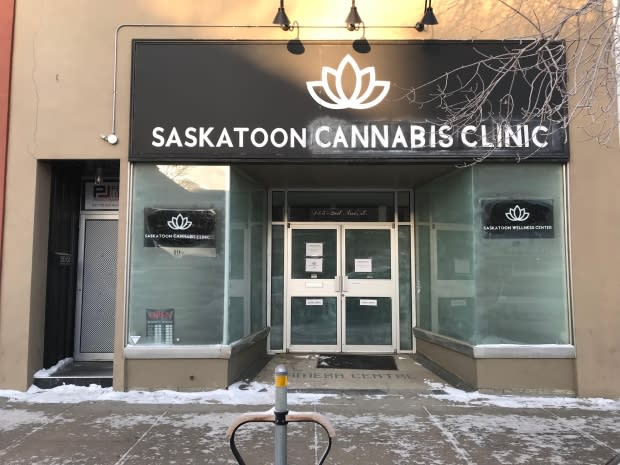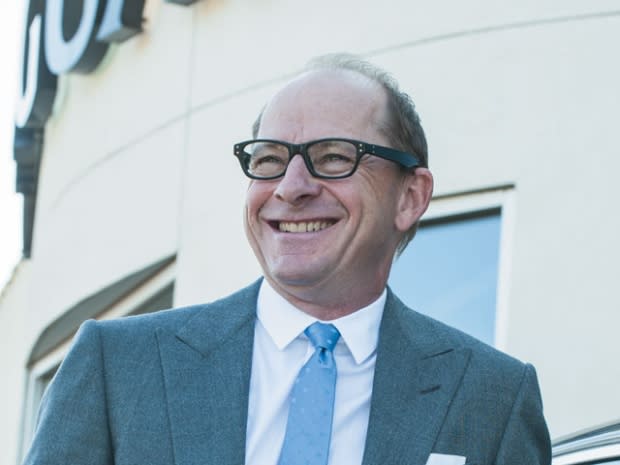Rogue Saskatoon pot dispensary vexes police, government and licensed cannabis dealers
An illegal cannabis outlet in the heart of Saskatoon's downtown retail district quietly closed its doors this week, although its signage and instructions to customers remain in place.
The Saskatoon Cannabis Clinic was a public thorn in the side of police, government and licensed pot dealers for the past five months.
Since October 2018, the Saskatoon Cannabis Clinic at 155 2nd Ave. S stayed open, weathering at least three police raids. It has no city business license, it is not licensed by Saskatchewan Liquor and Gaming Authority to sell cannabis recreationally and it is not recognized by Health Canada as a legitimate medical cannabis supplier.
It sold precisely the type of cannabis products the licensed stores are not allowed to retail: hashish, edibles, oils and potent concentrates like shatter.
Employees at the store refused to disclose who manages the business and would not identify its owner.
What is known is that the Saskatoon Cannabis Clinic rented main floor space in a building owned by C.O.T. Investments Ltd., a real estate holding company that lists auto dealer Vaughn Wyant as president and Saskatoon architect Kent Sutherland as secretary.

Both Wyant and Sutherland declined repeated interview requests.
"I can't talk to you. I'm sorry," Sutherland said when contacted by CBC.
"Do you mind just not calling at all?"
Growing frustration
One person who will talk about the Saskatoon Cannabis Clinic is RJ Fafard. He manages The Pot Shack, one of seven government-approved outlets in the city. Three are currently open.
"It's black and white. You're either legal or you're not legal," he said.
"The first thing that goes through our mind is frustration, because we seem to be playing by a certain set of rules and we're regulated heavily."
Fafard recently reached out to city council to voice his frustration and to try and find out how an illegal competitor was able to stay in business.
"I am a tax-paying member of Saskatoon and I demand some answers soon," Fafard wrote to council at the end of January. That letter is to be presented to the Saskatoon Board of Police Commissioners meeting Thursday.
"The seven legal cannabis retailers had to jump through all the hoops to operate abiding by all the laws. A $20,000 business license was required to be paid and yet we have places selling illegally everyday. This is wrong and not fair."

Fafard suggests significantly higher fines, or jail time, are needed to close down the rogue operation.
Police silent
Saskatoon Police will not talk about its strategy for dealing with the dispensary.
"Our officers are in the midst of an investigation, which is why we cannot speak to the case right now," wrote public affairs consultant Julie Clark.
Police, for instance, will not comment on whether they've contacted the owners of the building about the actions of their tenants. On Wednesday, police said it had not been raided a fourth time.
Police did file papers at provincial court to obtain a search warrant before their most recent raid of the Saskatoon Cannabis Clinic earlier this month. The document forms the basis for the court approving the warrant.
It provides an overview of the police investigation.
Vice officer Allison Braun wrote that police delivered a letter to staff at the 2nd Avenue store on Oct. 24, 2018, notifying them that selling cannabis without a permit is illegal and, that should they continue, "enforcement would occur."
The store remained open and police executed searches on Dec. 21, 2018 and Jan. 21, 2019 and then, most recently, on Feb. 11, 2019.
In a news release, police said officers seized unregulated cannabis and cannabis-related products.
In the search warrant information, Braun lays out exactly what police believe is motivating staff at the clinic — and it has nothing to do with helping individuals access medical marijuana.
"Persons engaged in the sale of dried cannabis, cannabis infused edibles and cannabis oil products and its derivatives from cannabis dispensaries are generally motivated by financial gains," Det. Const. Braun wrote.
"Selling drugs … results in substantial amounts of cash being exchanged, as cannabis dispensaries generally only accept payments in cash and often accumulate large amounts of cash."
No paper trail
There is a sheet of paper taped to the front door of the Saskatoon Cannabis Clinic that says the customers need to be 19 years or older to enter, and that it sells cannabis products for medical purposes.
CBC approached the store staff in October after the government made recreational cannabis legal.
An employee confirmed that it sells cannabis products for medicinal purposes. Potential customers fill out a form indicating their health malady, the name of their doctor's office and whether they've used cannabis medically in the past.
No paperwork is requested to corroborate whether a person is making up symptoms to buy cannabis recreationally or if they are buying it for a legitimate medical need.
The store has re-opened with stocked shelves within days of each police bust.

